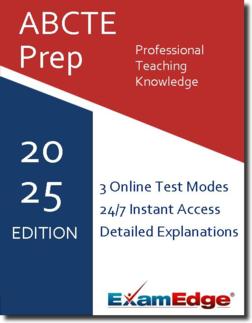ABCTE Professional Teaching Knowledge ( Professional Teaching Knowledge) Practice Tests & Test Prep by Exam Edge - Topics
Based on 29 Reviews
- Real Exam Simulation: Timed questions and matching content build comfort for your ABCTE Professional Teaching Knowledge test day.
- Instant, 24/7 Access: Web-based ABCTE Professional Teaching Knowledge practice exams with no software needed.
- Clear Explanations: Step-by-step answers and explanations for your ABCTE exam to strengthen understanding.
- Boosted Confidence: Reduces anxiety and improves test-taking skills to ace your ABCTE Professional Teaching Knowledge (PTK).

Understanding the exact breakdown of the ABCTE Professional Teaching Knowledge test will help you know what to expect and how to most effectively prepare. The ABCTE Professional Teaching Knowledge has 100 multiple-choice questions and 1 essay questions. The exam will be broken down into the sections below:
| ABCTE Professional Teaching Knowledge Exam Blueprint | ||
|---|---|---|
| Domain Name | % | Number of Questions |
| Instructional Design | 18% | 18 |
| Effective Instructional Delivery | 32% | 32 |
| Classroom Management and Organization | 30% | 30 |
| Assessment | 20% | 20 |


